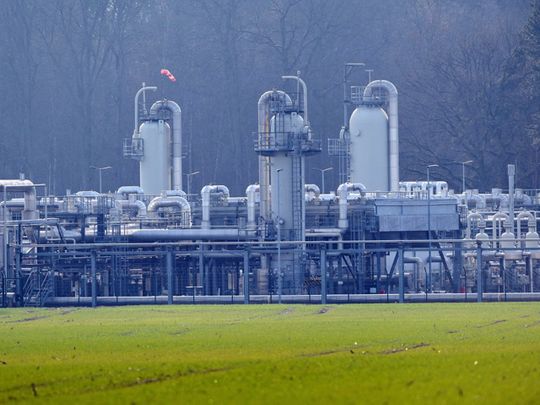
Frankfurt: Austria and Germany activated their emergency plans to secure gas supplies on Wednesday, as fears rose that Russia could cut off supplies if Western countries refused to make payments in rubles.
"A crisis room will now be established in the ministry" to monitor the supply situation, German Economy Minister Robert Habeck told a press conference.
On Thursday, Russian President Vladimir Putin said that European buyers could continue making gas payments in euros, according to a German readout of a call he had with Chancellor Olaf Scholz.
De-escalation
The comments appear to be a de-escalation from Moscow, which has been threatening to force consumer nations to pay for gas in rubles. The Group of Seven industrialised nations had refused to cave, raising the prospect that crucial gas supplies to Europe could be cut off.
The Kremlin separately said in a statement on Wednesday that switching to ruble payments shouldn't deteriorate contract terms for European importers of Russian gas.
Putin told Scholz that after European buyers make payments in euros to lender Gazprombank, it would convert the currency to rubles, German government spokesman Steffen Hebestreit said in a statement.
European gas prices fell as much as 9.9% on Thursday before easing back to trade 6% lower. Fear of a possible cutoff of Russian gas - worsened by the threats on ruble pricing - had driven prices higher in recent days
Early warning
The "early warning" measure, the first of three alert levels under the government's gas plan, was "preventative" and intended to assure supply of the fuel, Habeck said.
Only at the third "emergency" level would the government intervene in the market to divvy up limited supplies, prioritising "protected" consumers including homes and hospitals, the ministry said in a statement.
Austria followed suit, saying it would "strengthen existing monitoring systems" to prepare the ground for a response if supplies were suddenly cut off.
The immediate cause was "Russia's announcement that in future it would only accept payment for gas in rubles", the government said in a statement.
Russian President Vladimir Putin said last week that Moscow will now only accept rubles as payment for natural gas deliveries to "unfriendly" countries, including the European union.
The Kremlin indicated on Wednesday it would not immediately demand payments in its own currency, while Putin told German Chancellor Olaf Scholz the change should not mean contracts would be on worse terms.
The proposed arrangement was labelled as "unacceptable" by energy ministers from Group of Seven (G7) countries earlier this week.
"We are not going to accept a breach of the private contracts" for gas deliveries, Habeck said.
Gas dependence
While tensions are high and supplies uncertain, the European Union has announced plans to slash its imports of Russian gas by two-thirds this year.
Around 40 percent of the bloc's gas supplies came from Russia last year, with the number higher in some member states.
That is the case for Germany, which imported 55 percent of its natural gas from Russia before the outbreak of hostilities.
Since then, Europe's largest economy has accelerated plans to wean itself off Russian gas, diversify its supplies and ramp up investments in renewable energy.
But it has so far resisted moves to stop deliveries completely.
Cutting supplies from one day to the next would "push our country and the entire Europe in a recession", Scholz said last week.
"Hundreds of jobs will be in danger, entire industries would be on the brink," Scholz warned.
German gas reserves were currently at 25 percent of capacity, Habeck said, adding that a stop to deliveries from Russia would have "serious" consequences.
While supplies continued to flow, "we are in a situation where every kilowatt-hour saved helps," Habeck said in an appeal to private consumers and businesses to limit their energy use.
The government has already begun a survey of companies' energy needs ahead of the coming European winter in the event that gas supplies need to be rationed.
Deliveries
Other EU countries have called for faster action to further limit deliveries of Russian gas.
Polish Prime Minister Mateusz Morawiecki branded the dependence on Moscow for energy a "stupidity" and called on the EU to impose a tax on imports from Russia.
Morawiecki said an EU tax was necessary because Germany and other European countries were unwilling to stop buying Russian energy products, which tended to be cheaper, and the levy would "equalise energy prices in all of the European Union".
In Italy, which is highly dependent on gas imports to meet its energy needs, the government engaged the first step of its gas response plan at the end of February, three days after the invasion.












